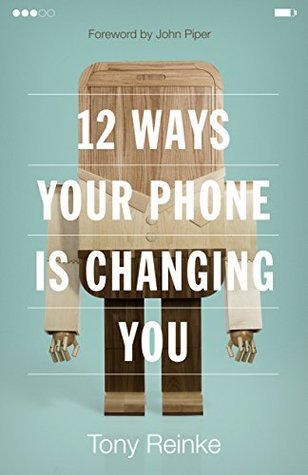More on this book
Community
Kindle Notes & Highlights
O’Donovan concluded the interview with a striking warning: “This generation has the unique task assigned it of discerning what the new media are really good for, and that means, also, what they are not good for. If they fluff it, generations after them will pay the price.”10
the more addicted you become to your phone, the more prone you are to depression and anxiety, and the less able you are to concentrate at work and sleep at night.
Jordan Carlson liked this
game. Because we are all so interconnected, hundreds of people (friends, family members, and strangers) can interrupt us at any moment.
What is a distraction? And, most foundational of all, what is the undistracted life?
Tim Keller was once asked online: Why do you think young Christian adults struggle most deeply with God as a personal reality in their lives? He replied: “Noise and distraction. It is easier to tweet than pray!”40 (Said on Twitter, no less!) The ease and immediacy of Twitter is no match for the patient labor of prayer, and the neglect of prayer makes God feel distant in our lives.
habit, the stats are now canonical. Talking on the phone while driving a vehicle makes you four times more likely to get into an accident, but texting while driving makes your chance of a crash twenty-three times more likely. Assuming a driver never looks up in the average time it takes to send a text (4.6 seconds), at fifty-five miles per hour, he drives blindly the length of a football field.
On top of this, eye contact is one of the most powerful forms of social bonding possible, forging trust between people in a complex phenomenon whereby people can sync their minds and gain mutual understanding, learning, and sharpening in ways impossible through digital devices.
it. If you follow Christ, the world will unfollow you.
By preserving our isolation, we unwittingly walk right into one of the world’s most brilliant marketing traps. “For manufacturers and marketers, human beings are best when they are alone, since individuals are forced to buy one consumer item each, whereas family or community members share,”
In light of the pace of all these digital temptations, a young man who struggled with digital vices asked if he should give up his smartphone and revert back to a “dumbphone.” John Piper applied a wise strategy: “My guess is that some are going to say, ‘Well, look, Piper, since the phone is not the problem, but the heart is the problem, it is pointless to pitch the phone.’ To which I respond, ‘No, it is not pointless to pitch the phone.’”
We fight on two fronts in the battle for holiness in the digital age, he explained. “We are fighting on the internal front of the heart—the heart front to be so satisfied in Jesus, to see him so clearly and love him so dearly and follow him so nearly that nothing, not even a smartphone, can control us. But biblically, we are also fighting on the external front to remove or avoid stumbling blocks to our faith.”
It serves rather to fix our perception upon the momentary now, preventing retrospection, discouraging deliberation, holding us spellbound in a suppositious world of the present which, like hell itself, has lost its future and its past.”10
or fall into the pit of existential despair by disregarding our past and future (nihilism).
In chasing after all these new fragments, we simply lose our place in time.
And that leads me to my point: I do not have “time to kill”—I have time to redeem.
Jordan Carlson and 1 other person liked this
Run with diligence. Cast off everything that distracts, unfetter your life from the chains that trip your ankles, and bolt with freedom and joy as you follow Christ. It is here, now, that the Spirit works tirelessly. It is here, now, that the work of Christ proves triumphant in the world. It is here, now, that the powers and principalities, defeated at Calvary, are being flaunted in defeat by the unity of the church.11
Yes! “We must play,” Lewis says about our relationships. “But our merriment must be of that kind (and it is, in fact, the merriest kind) which exists between people who have, from the outset, taken each other seriously—no flippancy, no superiority, no presumption.”15 We never jest about sin, and we don’t joke to puff ourselves up or to harm others.
But our remembering is not like flipping through a dusty scrapbook of reminiscence. The Bible cuts into our hearts with a living-and-active memory for daily life in the digital age. The Word calls us to remember in order to obey, as the apostle Peter explained when he said that our aim is Christian maturity that grows from faith to goodness, from knowledge to self-control, from perseverance to godliness, and finally from mutual affection to love. “For whoever lacks these qualities is so nearsighted that he is blind, having forgotten that he was cleansed from his former sins”
All spiritual growth is rooted in remembering what Christ has done in me.
Remembering is a key verb of the Christian life. We recall our past, we correct our nearsightedness, we take heart, we regain mental strength, we find peace in the eternal Word. Remembering is one of the key spiritual disciplines we must guard with vigilance amid t...
This highlight has been truncated due to consecutive passage length restrictions.
C. S. Lewis called it the “Nothing” strategy in his Screwtape Letters. It is the strategy that eventually leaves a man at the end of his life looking back in lament: “I now see that I spent most of my life in doing neither what I ought nor what I liked.”


